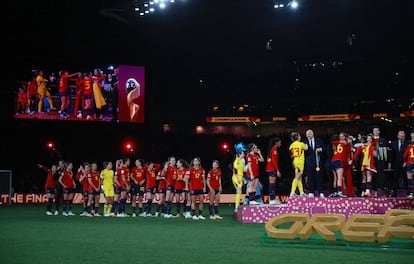Why a non-consensual kiss has marred Spain’s first Women’s World Cup title
Luis Rubiales — the president of the Royal Spanish Football Federation — forcibly kissed top-scorer Jenni Hermoso, after her team defeated England 1-0. He then followed her into the locker room and joked about marrying her. These occurrences eclipsed a historic moment in women’s soccer

A kiss wasn’t just a kiss when Luis Rubiales — the president of the Royal Spanish Football Federation — planted one on a star player from the national team, as she was collecting her medal as a new world champion. Jenni Hermoso, her team’s top scorer, had made history as part of the first Spanish team to win the Women’s World Cup, when she was unexpectedly and forcibly kissed by Rubiales.
Before this incident took place, just after the women led Spain to victory, their coach — Jorge Vilda — boasted that “we are world champions,” even as he was booed by fans. For years, he has been criticized for a lack of professionalism, along with other male members of Spain’s soccer establishment.
The non-consensual kiss by Rubiales follows a turbulent pattern of mistreatment and inequality, with Spain’s female soccer players facing poor salaries, inadequate training conditions and lodgings, as well as an insufficient number of support staff.
This past Sunday, more than 75,000 people attended the Accor Stadium in Sydney, Australia, to watch the final match of the 2023 FIFA Women’s World Cup. Meanwhile, another nine million viewers in Spain parked themselves in front of their TVs.
In the box — alongside Spain’s Queen Leticia and 16-year-old Infanta (princess) Sofía — the president of the Royal Spanish Football Federation would celebrate the victory by cupping his testicles with his right hand. This crotch-grabbing is a vulgar gesture embraced by many male soccer fans: it apparently means something along the lines of “here I am.” Off the field, the often-absent coach gave statements to the media, celebrating the victory as if it were his own. Clearly, the automatic pilot of patriarchal language kicked in.
Fifteen minutes after play had ended, in the center of the field, the ceremony was held to award the medals and the World Cup. The players were received by the Queen, the Infanta, FIFA President Gianni Infantino and Rubiales. When Jennifer Hermoso reached Rubiales, he first hugged her, then placed his hands on both sides of her head. Holding her firmly, he kissed her on the mouth.

In the changing room, the women celebrated. On her Instagram live, Hermoso — who is both a forward and an attacking midfielder — spoke about the kiss: “What am I supposed to do? Look at me,” she grimaced. “I didn’t like it, you know?”
Amidst the celebration, Rubiales arrived. His surprise appearance was captured on Instagram by left-winger Salma Paralluelo. The president of Spanish football took Hermoso by the shoulder: she leaned away from him, keeping her hips away from his body. He said that he’d take her on a trip to Ibiza “to celebrate their wedding.”
The image of the kiss and the video of Hermoso in the locker room are now circulating around the world. Only after the non-consensual act and lewd comments went viral did the Royal Spanish Football Federation (RFEF) issue a statement. The RFEF claimed that it had collected comments from Hermoso herself: “It was a totally spontaneous mutual gesture out of immense joy. The president and I have a great relationship. His behavior with all of us has been outstanding. [The kiss] was a natural gesture of affection and gratitude.” Her earlier comments made on Instagram were not addressed.
Rubiales also spoke to different media outlets, claiming that the outcry was “bullshit” and that his kiss was simply “two friends celebrating something.” He called those who were outraged “stupid idiots.”
Jenni Hermoso has told the media that “there is nothing more to say” and that the incident “will remain an anecdote.” “We’re champions with stars under our chests,” she concluded. What else is a female athlete expected to do or say right after winning the World Cup, when she’s been kissed by her country’s federation president with millions of people watching?
Hours later, Rubiales — under pressure — gave a sort of half-hearted apology, in which he alluded to how the moment of victory had been “tarnished.” It was Rubiales who stained this historic victory, before attempting to whitewash and minimize his behavior. This speaks not only to an absolute lack of respect, but also to the prevalence of rape culture: the beliefs, stereotypes and behaviors that feed the idea that women — and therefore their bodies — are the property of men.
The notion that Rubiales could kiss Hermoso on the mouth without consequences — without considering her feelings and personal space — is indicative of the absence of a culture of consent. The effusiveness and emotion of the moment that some media outlets continue to mention — saying things like, “well, it’s not that bad” — demonstrates a lack of understanding about where the limits are. For some men, these limits don’t exist. Forcibly kissing a woman in plain view of millions of people is a demonstration of the extent to which rape culture is inserted into public life and exercised with impunity.
Late last night on Twitter, Irene Montero — Spain’s acting minister for Equality — posted the following message: “Let’s not take it for granted that kissing [someone] without consent is something that simply ‘happens.’ It’s a form of sexual violence that women suffer on a daily basis… We cannot normalize this. Consent is [essential].” Ione Belarra, minister of Social Rights, reposted this, while adding: “[Imagine] if they do that with all of Spain watching, what do they do in private? Sexual violence against women has to end. A hug to the champions!”
The sexual violence to which the ministers refer to is part of the Spanish laws concerning sexual freedom, which state that “any act that violates the sexual freedom of another person without their consent” and “sexual acts” carried out via the “abuse of a position of authority” are considered to be sexual assault.
The country’s Sports Law, meanwhile, establishes the obligation for federations and professional leagues to have “a prevention and action protocol” for incidents like this, which “should be brought to the attention of the sanctioning body under the Higher Sports Council. Any action that may be considered discrimination, abuse or sexual harassment and/or harassment based on sex or authority is to be punished as a serious offense.” In Spain, the consequences of actions such as the ones committed by Rubiales range from a public reprimand to a fine of between 600 and 3,000 euros, or disqualification from holding positions in the RFEF for a period between one month and two years.
Between August 2022 and August 2023, the Women’s National Football Team of Spain has won the Women’s U-17 Championship, the Women’s U-20 Championship and now the World Cup. This is the only team in history to have held all three titles at once. Last night wasn’t only a victory in the world of sports, but also a symbolic win for social equality for girls and women. But even as champions, with the World Cup in hand, the champions are still seen by some men from a patriarchal perspective — they can even be kissed without their consent or crudely remarked upon by men who believe they have the power to do so.
Sign up for our weekly newsletter to get more English-language news coverage from EL PAÍS USA Edition
Tu suscripción se está usando en otro dispositivo
¿Quieres añadir otro usuario a tu suscripción?
Si continúas leyendo en este dispositivo, no se podrá leer en el otro.
FlechaTu suscripción se está usando en otro dispositivo y solo puedes acceder a EL PAÍS desde un dispositivo a la vez.
Si quieres compartir tu cuenta, cambia tu suscripción a la modalidad Premium, así podrás añadir otro usuario. Cada uno accederá con su propia cuenta de email, lo que os permitirá personalizar vuestra experiencia en EL PAÍS.
¿Tienes una suscripción de empresa? Accede aquí para contratar más cuentas.
En el caso de no saber quién está usando tu cuenta, te recomendamos cambiar tu contraseña aquí.
Si decides continuar compartiendo tu cuenta, este mensaje se mostrará en tu dispositivo y en el de la otra persona que está usando tu cuenta de forma indefinida, afectando a tu experiencia de lectura. Puedes consultar aquí los términos y condiciones de la suscripción digital.









































